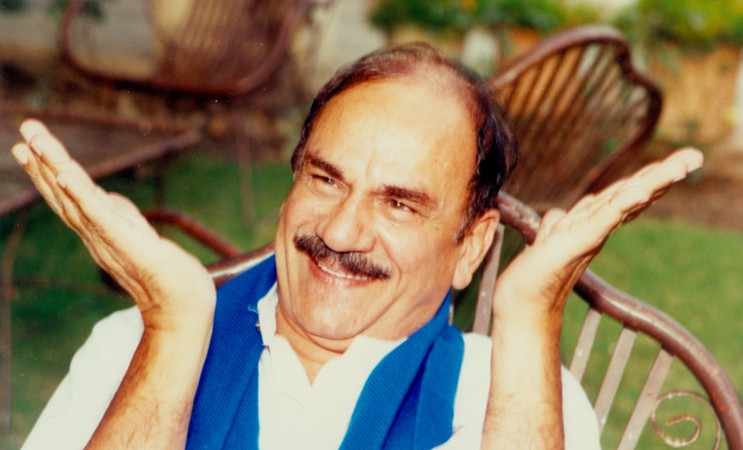
Ali Ejaz was one of the few actors who managed to transition successfully from theatre to screen

Ali Ejaz who died last week was an actor of great accomplishment. Though he played all kinds of roles but his real forte was comedy. It is only to state the obvious that comedy requires an intuitive sense of timing and Ali Ejaz had oodles of it. The repartees were finely tuned and timed to perfection to get the best results.
Much has been written about since his passing away of his contribution to films and television, only because the two mediums have an outreach that is greater but his contribution to the growing theatre scene of the Punjab, particularly Lahore, was seminal. The professional theatre, if it could be called professional, was a very limited affair with Alhamra being the only substantial venue for the staging of plays, consisting mostly of adaptations of famous western plays and a small bunch of actors under the guidance of Faiz Ahmed Faiz, Imtiaz Ali Taj, Safdar Mir and Ali Ahmed performed to a limited audience, which could qualify to be elitist at least in the sense of its cultural orientation.
But by the late 1960s it was evident that theatre scene was expanding and more plays needed to be staged. It also had the potential to be financially viable. The second makeshift stage on the lawns of the erstwhile Alhamra premises was enacted and plays started being staged there.
It was on this stage that the talent of Rafi Khawar (Nannah), Masood Akhter, Khalid Abbas Dar, Najma Mehboob, Athar Shah Khan blossomed, and the most to flourish was that of Ali Ejaz. It was as if suddenly the talent within him had been given the opportunity to realise itself. The greater opportunity and the ability to make a living out of theatre were two very big incentives for these thespians to convert this into a full-time activity.
This was a period before other popular actors like Amanullah and Albela started to steal the thunder. But it was the consequence of the greater censorial outbursts that theatre moved out of specialised, dedicated environment to hotels and restaurant. The prohibition also added to hotels opening their doors, actually lawns, to these theatre groups to perform, given the growing audience. A flourishing theatre activity started at four or five such makeshift venues.
Television, it must be stated, snowballed their popularity. These actors, only voices on the radio, could now also be seen. The public at large started to identify the names with the faces and this increased their rating. Television and theatre complemented each other and the actors, script writers and directors created a niche for themselves through television and then made money from the plays where the box office returns showed satisfactory results. From then on, the stage could be taken seriously as a professional venture that could make the personnels associated with it live off it without recourse to moonlighting.
What really happened was the indigenisation of characters, to begin with, and then the situations in the plays. The particular themes that resonated with the growing and diverse audiences were the rural-urban divide, the language barrier, the emerging nouveau riche circles and then the growing trend of going off to the Middle East, thereby bringing about a silent economic revolution that saw the class figuration undergo a sea change.
Ali Ejaz was able to capture the changes that were taking place and incorporated them in the new character types that were emerging as a consequence. One of the most popular plays was thus Dubai Chalo and it struck a chord with the growing middle-class that was becoming part of the growing theatre audiences. The social disruption and the new formations in society and its cultural fallouts were sealed. It was later with this in mind that a film was also made with the same theme and more or less the same cast.
It may be added that the comedy that was created on the stage was not risqué at all. The movements too were not vulgar and exaggerated to titillate. The dialogues or the one-liners were not based on double entrende and that it was not as gross as it was to become later. The tendency to adlib and to be stand up comedians was on the increase and it drew most plaudits and "claps" as they say in the local theatre parlance. This at times was necessary to outwit the censors which had become too stifling and left nothing unquestioned.
Despite his great talent for this all, Ali Ejaz resisted the temptation of growing too big for the role or even the play. He paid equal respect to the play and the entire structure, and did not let the actor overshadow the character. It may be said that many of the blockbuster films of the era were initially successful theatre plays that were then made into films and, as expected, did roaring business and galvanised the changing mores of society.
At the same time, Ali Ejaz was also a very famous television actor and some of his roles truly reflected the types found in Punjabi society. He was able to progress and become a very successful film actor. It has been a dream of actors working on stage and television to be make a successful transition to the big screen, thought to be the apogee of the profession. Many tried, only some succeeded and Al Ejaz was one of them. In the 1970s and ’80s, as Punjabi cinema thrived, Ali Ejaz contributed significantly to it.